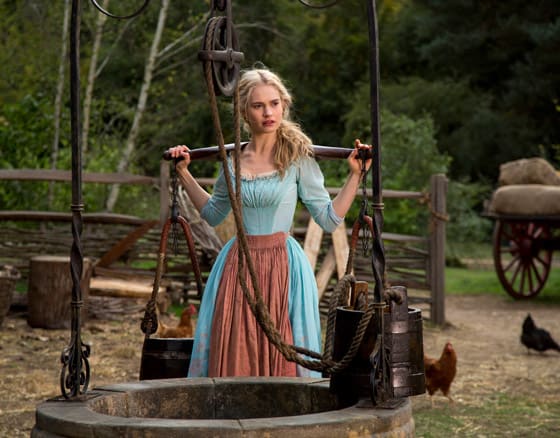In recent years, Walt Disney Pictures has been trying to distance themselves from the dated and damaging "damsel in distress" princess fairy tales that made them the animation behemoth they are today; Prince Charming does not save the day in either Frozen or in the live action Maleficent. And with last year's Into the Woods, Disney set out to challenge audience expectations of a happy ending from every fairy tale. But how does one avoid the princess trappings when the story they're telling is perhaps the most famous princess story of all time?
The answer is with love, apparently. In Kenneth Branagh's Cinderella, the trick to wooing a whole new generation of little girls with the princess fantasy, without inflicting the impossible standards said fantasy places on these girls' psyches, is to show the love transpire between Cinderella (Downton Abbey's Lily James) and her prince (Game of Thrones' Richard Madden). The assumption is that if we can see these two genuinely fall for each other, rather than just see two one-dimensional cartoon characters be inexplicably taken by each other after a touch and a glance, that this will imbue the princess trope with real emotion. That's not entirely the case here; despite the slightly better exposition, the prince still saves Cinderella from her more or less abusive household and transforms her life into something more magical than she ever imagined.
After injecting some sorely needed Shakespearean tone to Thor in 2011, one might expect more gravitas from Branagh here. The screenplay by Chris Weitz (About a Boy) is no help, as he keeps most of the story and characters as underdeveloped as they have always been. With the exception of one or two scenes thrown in to show the budding romance between our heroine and her prince, we are essentially treated to the same story we already know all too well, including pumpkin carriages, communication with rodents and glass slippers.
Of course, the wicked stepmother part, played by an ominous and legitimately chilling Cate Blanchett, is beefed up to give the film a bit more bite, but even Blanchett can't elevate this to a magical place.
(Disney)The answer is with love, apparently. In Kenneth Branagh's Cinderella, the trick to wooing a whole new generation of little girls with the princess fantasy, without inflicting the impossible standards said fantasy places on these girls' psyches, is to show the love transpire between Cinderella (Downton Abbey's Lily James) and her prince (Game of Thrones' Richard Madden). The assumption is that if we can see these two genuinely fall for each other, rather than just see two one-dimensional cartoon characters be inexplicably taken by each other after a touch and a glance, that this will imbue the princess trope with real emotion. That's not entirely the case here; despite the slightly better exposition, the prince still saves Cinderella from her more or less abusive household and transforms her life into something more magical than she ever imagined.
After injecting some sorely needed Shakespearean tone to Thor in 2011, one might expect more gravitas from Branagh here. The screenplay by Chris Weitz (About a Boy) is no help, as he keeps most of the story and characters as underdeveloped as they have always been. With the exception of one or two scenes thrown in to show the budding romance between our heroine and her prince, we are essentially treated to the same story we already know all too well, including pumpkin carriages, communication with rodents and glass slippers.
Of course, the wicked stepmother part, played by an ominous and legitimately chilling Cate Blanchett, is beefed up to give the film a bit more bite, but even Blanchett can't elevate this to a magical place.
